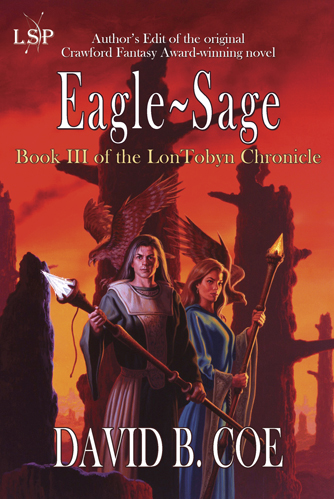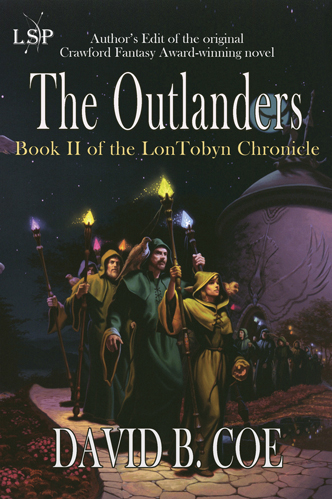author interview • character development • character questions • Characters on the Couch • David B. Coe • fantasy • fiction • high fantasy • psychological analysis of character • psychology • published character interview • urban fantasy
Character on the Couch: David B. Coe’s Melyor i Lakin
February 3, 2017
It’s a special Saturday edition of Characters on the Couch! Why? Because as I mentioned in my last blog post, I’ve been buried under book release and nonfiction deadline stuff, and I let all kinds of balls drop in the past two months. All I can say is I’m really sorry, but trust me, this one was worth the wait.
I met David B. Coe at DragonCon last year and enjoyed chatting with him. He’s a former historian, and you can tell from his worlds that he knows how to research and convey the details that make setting realistic. I’m delighted to have his character Melyor i Lakin from The Outlanders and Eagle-Sage, books 2 and 3 of the LonTobyn Chronicle, on the couch today.
About the series:
For a thousand years, the Children of Amarid, mages and masters whose power flows from psychic connections they form with birds of prey, have guarded the idyllic land of Tobyn-Ser, a realm of lofty mountains, rolling plains, and deep, verdant forests. Their magic has brought peace, prosperity, and the complacency that a millennium of pastoral comfort might breed.
Now, however, it seems that the mages have abandoned their oaths to serve Tobyn-Ser, bringing fear and chaos to the land and shaking the peoples’ faith in the mages and their Order. Have renegades infiltrated the Order? Has the spirit of Theron, a dark mage who cast a curse on the Children of Amarid in its earliest days, returned to haunt the land? Or does Tobyn-Ser face an even greater threat from its sister land of Lon-Ser, a realm of vast, violent cities and technological wonders beyond imagination.
The interview:
1. If your character were to go to a psychologist – willingly or unwillingly – what would bring them in? Yes, a court order is a valid answer.
My character, Melyor I Lakin, who first appears in the second book of my LonTobyn Chronicle, THE OUTLANDERS, would be brought in for violent anti-social behavior — beatings, stabbings, the occasional assassination. Some of these she would have carried out herself; others would have been done by her underlings on her orders. And she would argue that she’s really not responsible for all she’s done. This is what it takes to survive in her world. But, of course, that could just be an excuse.
The thing is, though, discussion of these symptomatic behaviors would soon reveal a deeper issue. Melyor is a Gildriite, capable of Seeing the future. This is something she must keep secret, because her kind have been persecuted in Lon-Ser for hundreds of years. And because she lives in a highly technological society that thrives on mistrust, violence, and a sort of modern feudal system founded on fear and retribution, it would be incredibly dangerous for her to reveal her ancestry to anyone.
2. Is the presenting problem one of the main internal or external conflicts in your book? If so, how does it present itself?
Melyor’s past, her ambitions, her desire to thrive in a system that is, in many ways, inimical to who she really is, lie at the very heart of the story in books two and three (EAGLE-SAGE) in my series. She is a central character, and when she meets up with a sorcerer from another land, whose abilities resemble her own, she begins to grasp the full import of Gildriite history. This, in turn, leads her to question all that she has done in her life, and to consider that perhaps living within this violent system is not for her. Hijinks ensue…
3. It’s always interesting to see how people act when they first enter my office. Do they immediately go for my chair, hesitate before sitting anywhere, flop on the couch, etc.? What would your character do?
Melyor would not sit. Or if she did, she wouldn’t manage to remain still for long. She would stalk about the room, restless, trapped, avoiding eye contact.
4. Does your character talk to the therapist? How open/revealing will your character be? What will he or she say first?
Her first impulse would be to crack wise. Her answers would oscillate between flippancy and defensiveness. She wouldn’t willingly reveal much, at least not until questions turned to her parents. She lost her mother, to an assassination attempt aimed at her father, when she was very young — she barely remembers her. And a second attempt on her father claimed his life when she was thirteen. She has essentially been on her own since. But she doesn’t resent her parents. She loved her father and remains fascinated by her mother. Given the proper questions, she might open up about them, and then, in turn, about herself.
5. Your character walks into the bar down the street after his/her first therapy session. What does he/she order? What happens next?
She would order an ale. And then probably three more. She might start a fight, just to relieve the tension that has built inside her since the therapy session began. She knows she’s better with a blade or a thrower (a firearm) than any man or woman there. A brawl presents little risk, and would certainly make her feel better. Or, on the other hand, she might find the most attractive man or woman in the bar, buy him or her a couple of drinks, and then take this person back to her flat for the night. She’s beautiful, and her reputation has spread through much of the Nal. No one there would refuse her.
6. When you’re building characters, do you have any tricks you use to really get into their psyches, like a character interview or personality system (e.g., Myers-Briggs types)?
I rely on what I call the ABCs of character. I create detailed character sketches based upon Attributes, Background, and Circumstance. Attributes are the basic facts — appearance, age, profession, current family situation, faith, politics, socio-economic status, etc. Background is just what it sounds like — information about the character’s past, formative relationships and events, elements of personality (outgoing or shy, brusque or friendly, confident or filled with self-doubt, etc.) Background is where the secrets are, the things that give a character his/her strengths and weaknesses. And I do believe in giving all characters a secret or two. Finally, Circumstance is where we are as the story begins. What has happened to change the Attributes in some way (A divorce? Fired from a job? Loss of a loved one? An otherwise stable, normal life suddenly gone to hell?) This is where one finds the seeds of conflict for our narrative. This is also where strengths and weaknesses and secrets must be confronted and overcome (or used, in the case of strengths) to bring the character to some new equilibrium.
This is a system that works for me. And I have used it in many settings when teaching craft to new writers. I don’t rely on the personality systems (like Myers-Briggs), because they have less meaning to me, and because I find them too confining to be useful. But we all have to find our own techniques for building character.
 David B. Coe/D.B. Jackson is the award-winning author of nineteen fantasy novels. As David B. Coe, he writes The Case Files of Justis Fearsson, a contemporary urban fantasy from Baen Books. The first two books, Spell Blind and His Father’s Eyes came out in 2015. The third volume, Shadow’s Blade, has recently been released. Under the name D.B. Jackson, he writes the Thieftaker Chronicles, a historical urban fantasy from Tor Books that includes Thieftaker, Thieves’ Quarry, A Plunder of Souls, and Dead Man’s Reach.
David B. Coe/D.B. Jackson is the award-winning author of nineteen fantasy novels. As David B. Coe, he writes The Case Files of Justis Fearsson, a contemporary urban fantasy from Baen Books. The first two books, Spell Blind and His Father’s Eyes came out in 2015. The third volume, Shadow’s Blade, has recently been released. Under the name D.B. Jackson, he writes the Thieftaker Chronicles, a historical urban fantasy from Tor Books that includes Thieftaker, Thieves’ Quarry, A Plunder of Souls, and Dead Man’s Reach.
David is also the author of the Crawford Award-winning LonTobyn Chronicle, which he is in the process of reissuing, as well as the critically acclaimed Winds of the Forelands quintet and Blood of the Southlands trilogy. He wrote the novelization of Ridley Scott’s movie, Robin Hood. David’s books have been translated into a dozen languages.
He lives on the Cumberland Plateau with his wife and two daughters. They’re all smarter and prettier than he is, but they keep him around because he makes a mean vegetarian fajita. When he’s not writing he likes to hike, play guitar, and stalk the perfect image with his camera.
You can find him at his:
Website
Blog
D.B. Jackson website
Facebook
Twitter
Amazon Author Page



